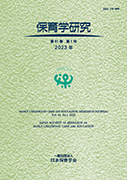Volume 61, Issue 1
Displaying 1-18 of 18 articles from this issue
- |<
- <
- 1
- >
- >|
Foreword
-
2023Volume 61Issue 1 Pages 3-4
Published: August 31, 2023
Released on J-STAGE: November 22, 2023
Download PDF (899K)
PartI Open Topic Articles
Articles
-
2023Volume 61Issue 1 Pages 7-18
Published: August 31, 2023
Released on J-STAGE: November 22, 2023
Download PDF (1293K) -
2023Volume 61Issue 1 Pages 19-30
Published: August 31, 2023
Released on J-STAGE: November 22, 2023
Download PDF (1051K) -
2023Volume 61Issue 1 Pages 31-42
Published: August 31, 2023
Released on J-STAGE: November 22, 2023
Download PDF (1059K) -
2023Volume 61Issue 1 Pages 43-54
Published: August 31, 2023
Released on J-STAGE: November 22, 2023
Download PDF (1988K) -
2023Volume 61Issue 1 Pages 55-66
Published: August 31, 2023
Released on J-STAGE: November 22, 2023
Download PDF (1936K) -
2023Volume 61Issue 1 Pages 67-78
Published: August 31, 2023
Released on J-STAGE: November 22, 2023
Download PDF (2428K) -
2023Volume 61Issue 1 Pages 79-90
Published: August 31, 2023
Released on J-STAGE: November 22, 2023
Download PDF (1051K) -
2023Volume 61Issue 1 Pages 91-102
Published: August 31, 2023
Released on J-STAGE: November 22, 2023
Download PDF (5149K) -
2023Volume 61Issue 1 Pages 103-114
Published: August 31, 2023
Released on J-STAGE: November 22, 2023
Download PDF (1044K) -
2023Volume 61Issue 1 Pages 115-126
Published: August 31, 2023
Released on J-STAGE: November 22, 2023
Download PDF (1042K) -
2023Volume 61Issue 1 Pages 127-138
Published: August 31, 2023
Released on J-STAGE: November 22, 2023
Download PDF (1819K)
Contribution Guidelines for "Research on Early Childhood Care and Education"
-
2023Volume 61Issue 1 Pages 140-142
Published: August 31, 2023
Released on J-STAGE: November 22, 2023
Download PDF (801K)
PartII Progress in Early Childhood Care and Education(I)
-
2023Volume 61Issue 1 Pages 145-152
Published: August 31, 2023
Released on J-STAGE: November 22, 2023
Download PDF (993K)
Contents
-
2023Volume 61Issue 1 Pages 154-155
Published: August 31, 2023
Released on J-STAGE: November 22, 2023
Download PDF (70K)
Afterword
-
2023Volume 61Issue 1 Pages 157-
Published: August 31, 2023
Released on J-STAGE: November 22, 2023
Download PDF (733K)
publication data
-
2023Volume 61Issue 1 Pages 158-
Published: August 31, 2023
Released on J-STAGE: November 22, 2023
Download PDF (727K)
Contents
-
2023Volume 61Issue 1 Pages 159-
Published: August 31, 2023
Released on J-STAGE: November 22, 2023
Download PDF (1180K)
- |<
- <
- 1
- >
- >|
